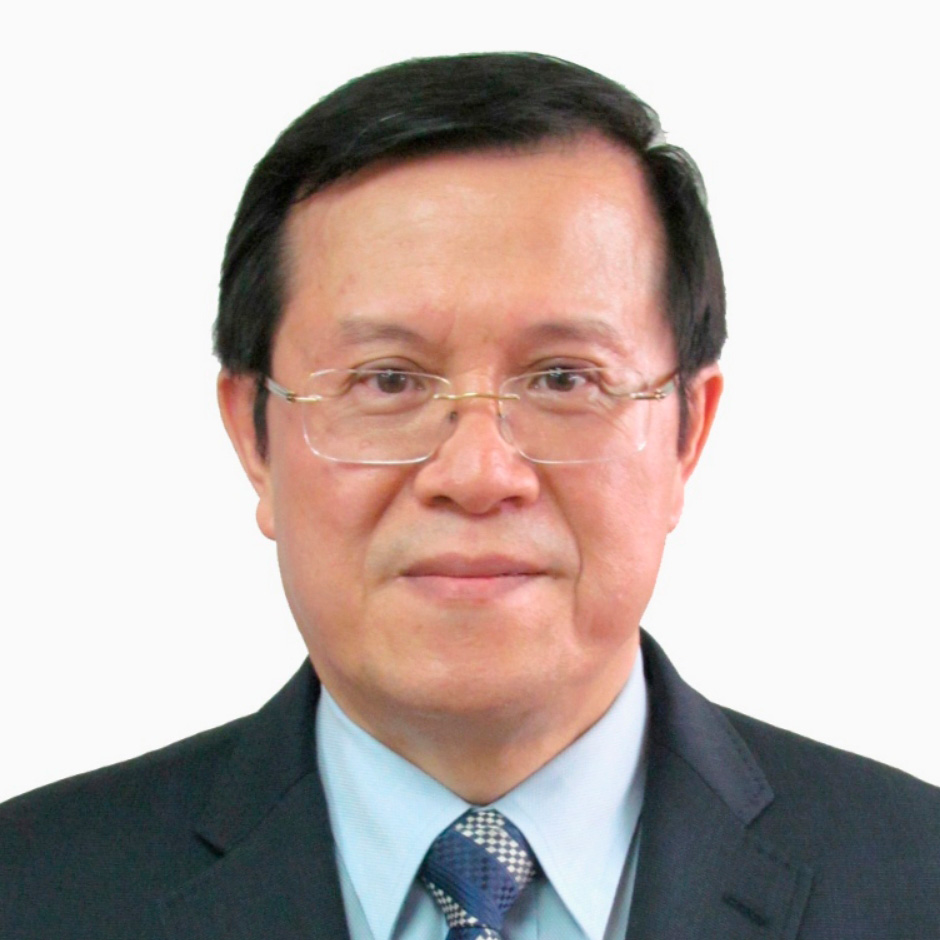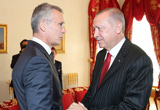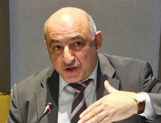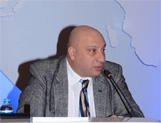China and Iran Eye Twenty Five Years Strategic Deal  By Benyamin Poghosyan, PhD, Chairman, Center for Political and Economic Strategic Studies By Benyamin Poghosyan, PhD, Chairman, Center for Political and Economic Strategic Studies
A proposed China-Iran 25 year strategic agreement may change the power balance in the wider Middle East. It may also increase Chinese interests in Armenia.
In January 2016, Chinese President Xi Jinping became the first world leader to visit Tehran following the lifting of international sanctions alongside the 2015 Iran nuclear deal. The visit resulted in the signing of 17 agreements on issues ranging from energy to boosting bilateral trade to $600bn. Now, discussions are underway regarding the possibility of a new China-Iran 25-year strategic partnership deal - an idea floated by President Xi, which has apparently received a warm reception amongst the Iranian leadership. READ MORE
Covid19 Outbreak - A Test to Global Governance  By Ong Tee Keat, Chairman, Center for New Inclusive Asia, Kuala Lumpur By Ong Tee Keat, Chairman, Center for New Inclusive Asia, Kuala Lumpur
On March 11th , 2020, Robert Redfield, the director of US Center for Disease Control & Prevention (CDC), dropped a proverbial bombshell when he testified to the US Congress admitting that numerous Corona virus deaths might have been miscategorized as flu. This belated admission of misdiagnosis has further lent credence to the earlier speculation that many pulmonary fibrosis cases which resulted in deaths due to patients' inability to breathe might in fact have been caused by the Corona virus. These cases, where symptoms might have been masked by attributions to e-cigarette or vaping, happened well before the virus outbreak in Wuhan, China. READ MORE.
Establishing Joint Armenia–China Peacekeeping Training Center in Armenia  By Benyamin Poghosyan, PhD, Chairman, Center for Political and Economic Strategic Studies By Benyamin Poghosyan, PhD, Chairman, Center for Political and Economic Strategic Studies
Peacekeeping operations are one of the key domains of international relations. They play a paramount role in securing stability and fostering international cooperation. Currently, fourteen peacekeeping operations around the globe are led by the UN Department of Peace operations. Several other international organizations are involved in peacekeeping missions, but the UN is the ultimate authority in this sphere. READ MORE
US and Russian Involvement in Recent Domestic Upheavals in Georgia and Armenia  By Benyamin Poghosyan, PhD, Chairman, Center for Political and Economic Strategic Studies By Benyamin Poghosyan, PhD, Chairman, Center for Political and Economic Strategic Studies
After the collapse of the Soviet Union the newly independent successor states faced numerous challenges: economic collapse, ethnic conflicts, and a rapid introduction of market reforms which ushered in large scale poverty as well as a quick enrichment of very small portion of the population. At the same time, there was a constant flow of Western experts and consultants who were embedded in almost all state institutions. In the first decade of independence there was a vague but widespread perception that the ultimate destination of former Soviet republics would be membership of the Euro-Atlantic institutions - EU and NATO. READ MORE
President Donald Trump’s Possible Second Term: Implications for Eastern Europe  By Benyamin Poghosyan, PhD, Chairman, Center for Political and Economic Strategic Studies By Benyamin Poghosyan, PhD, Chairman, Center for Political and Economic Strategic Studies
In November 2020 Americans will again go to the polls to elect the President of the United States. Upcoming elections could be one of the most polarized political events in decades. The American society is deeply divided between pro and anti-Trump camps. The economic crisis triggered by the COVID-19 and rising social and racial tensions will contribute to the fierce election campaign. Many Americans make their choice based on the economic situation at home are not interested in foreign policy. READ MORE
Presidential Elections in Karabakh: Background and Implications  By Benyamin Poghosyan, PhD, Chairman, Center for Political and Economic Strategic Studies By Benyamin Poghosyan, PhD, Chairman, Center for Political and Economic Strategic Studies
On March 31, 2020 presidential and parliamentary elections were held in unrecognized Nagorno Karabakh Republic. Five parties entered the Parliament, while President was elected during the second round, on April 14. The winner of the Presidential campaign was Arayik Harutyunyan, who received 49 percent of votes during the first round and 88 percent during the second round. However, his main contender Masis Mayilyan de facto boycotted second round asking his supporters not to participate in the elections due to the COVID19 outbreak. READ MORE
Coronavirus Presents Armenia with Difficult Challenges  By Benyamin Poghosyan, PhD, Chairman, Center for Political and Economic Strategic Studies By Benyamin Poghosyan, PhD, Chairman, Center for Political and Economic Strategic Studies
The COVID-19 pandemic has confronted governments with two massive simultaneous challenges. They have to contain the virus through large scale social distancing to prevent the uncontrolled growth of infected people and collapse of the health system. Meanwhile, each day that passes with economic activity virtually suspended puts an enormous pressure on businesses, and contributes to a possible social and financial collapse. Armenia faces the same dilemma. READ MORE
Coronavirus Presents Armenia with Difficult Challenges  By Benyamin Poghosyan, PhD, Chairman, Center for Political and Economic Strategic Studies By Benyamin Poghosyan, PhD, Chairman, Center for Political and Economic Strategic Studies
The COVID-19 pandemic has confronted governments with two massive simultaneous challenges. They have to contain the virus through large scale social distancing to prevent the uncontrolled growth of infected people and collapse of the health system. Meanwhile, each day that passes with economic activity virtually suspended puts an enormous pressure on businesses, and contributes to a possible social and financial collapse. Armenia faces the same dilemma. READ MORE
The Karabakh Elections Go to Second Round  By Benyamin Poghosyan, PhD, Chairman, Center for Political and Economic Strategic Studies By Benyamin Poghosyan, PhD, Chairman, Center for Political and Economic Strategic Studies
Elections were held in Nagorno-Karabakh on 31 March but since no candidate secured the necessary amount of votes a run-off is now expected between the two leading candidates in two weeks-time.
On March 31, 2020 Presidential and Parliamentary elections were held in Artsakh (Nagorno-Karabakh). Elections are not something new for Karabakh. Since the mid-1990s regular general as well as local elections have been held there. However, this time almost everything was different, such as the record number of candidates (14 running for the office of President and 10 parties and 2 blocks for Parliament) and the fully proportional electoral system. However, the key difference was the ambiguity of the position of Republic of Armenia's leadership. READ MORE
Rivals in the Midst of Domestic Transformations  By Benyamin Poghosyan, PhD, Chairman, Center for Political and Economic Strategic Studies By Benyamin Poghosyan, PhD, Chairman, Center for Political and Economic Strategic Studies
On February 9, 2020 early parliamentary elections were held in Azerbaijan. According to preliminary results the ruling "New Azerbaijan" party has won a clear majority, while, some representatives of opposition, such as Erkin Gadirli from REAL, have entered the Parliament. However, the main speculation around the elections was not the name of the winner; few if any had expectations that ruling party may lose the elections, or that the process will be in full compliance with liberal democracy requirements. The key question is on the implications of these elections for the domestic balance of power in Azerbaijan, and the future development of the country. READ MORE
- February 25, 2020 21:11PM
Rivals in the Midst of Domestic Transformations  By Benyamin Poghosyan, PhD, Chairman, Center for Political and Economic Strategic Studies By Benyamin Poghosyan, PhD, Chairman, Center for Political and Economic Strategic Studies
On February 9, 2020 early parliamentary elections were held in Azerbaijan. According to preliminary results the ruling "New Azerbaijan" party has won a clear majority, while, some representatives of opposition, such as Erkin Gadirli from REAL, have entered the Parliament. However, the main speculation around the elections was not the name of the winner; few if any had expectations that ruling party may lose the elections, or that the process will be in full compliance with liberal democracy requirements. The key question is on the implications of these elections for the domestic balance of power in Azerbaijan, and the future development of the country. READ MORE
- February 17, 2020 23:16PM
The Perspectives of Russia–Iran Relations in the Context of the Recent US–Iran Escalation  By Benyamin Poghosyan, PhD, Chairman, Center for Political and Economic Strategic Studies By Benyamin Poghosyan, PhD, Chairman, Center for Political and Economic Strategic Studies
The recent US – Iran escalation is the hot topic for the Middle East pundits. Many policy briefs have already been published discussing the motives behind the US and Iran actions, the implications of these developments on the US Presidential campaign and Iranian Parliamentary elections. Many experts are seeking to assess the future of the US – Iran relations and the Iran’s influence in the region. Meanwhile, US – Iran tensions which fell short of a full blown war will have an impact also on Russia – Iran relations and in particular on their uneasy partnership in Syria. READ MORE
Protests in Iran and Implications for Armenia  By Benyamin Poghosyan, PhD, Executive Director, Political Science Association of Armenia By Benyamin Poghosyan, PhD, Executive Director, Political Science Association of Armenia
”Recent waves of protests in Iran that broke out as a result of the Government decision to significantly raise gasoline prices, pose potential problems to all of its neighbors, including Armenia. One of the most critical problems can be the possible influx of refugees into the territory of Armenia and Nagorno Karabakh.
Domestic instability in Iran is a source of concern for all its neighbors, including Armenia. Iran is one of the only two open borders Armenia has to reach the outside world. Any significant weakening of Iranian state institutions may complicate the export and import operations through Iran which definitely will put additional pressure on the Armenian economy. READ MORE
Turkey-NATO Relations: Strained and Constrained  By Armine Arzumanyan, Graduate of Renmin University, PR of China By Armine Arzumanyan, Graduate of Renmin University, PR of China
China's main goals in Central Asia may not directly hint at the region's long-term strategic importance, but the outcomes of China's engagement in the region clearly show concrete signs of it. China's emergence as the dominant actor in the region’s energy and infrastructure sectors, along with its growing presence as the lender of choice for Central Asia, has had deep consequences as Beijing has quietly cultivated the defense component of its newfound presence in region. Though relatively little studied, China's energy-infrastructure-defense tridimensional approach is of immense importance. READ MORE.
- November 20, 2019 07:00AM
Perspectives of the US – China Relations and Implications for the Post-Soviet Space  By Benyamin Poghosyan, PhD, Executive Director, Political Science Association of Armenia By Benyamin Poghosyan, PhD, Executive Director, Political Science Association of Armenia
The US – China relations are usually described as the most powerful force to shape the global security architecture for the upcoming decades. They have gone through tremendous transformations over the recent 45 years. The opening to China launched by the Nixon Administration was part of a US strategy to deter and contain the Soviet Union. Since the late 1980s the US have accelerated its economic relations with China creating a heavy interdependence. READ MORE
- November 11, 2019 21:05PM
Armenia-Azerbaijan: Searching for New Models of Dialogue  Joint Study with “Yeni nesil”, coordinated by Boris Navasardian, President, Yerevan Press Club Joint Study with “Yeni nesil”, coordinated by Boris Navasardian, President, Yerevan Press Club
The main purpose of this study was to consider the feasibility and prospects of revival of the Track-2 diplomacy and the development of appropriate recommendations. Although it was conceived and supported by the US government even before the political changes in Armenia, its relevance was confirmed by the intensification of the dialogue at the official level between Yerevan and Baku in the summer of 2018. Certain characteristics of the renewed interest in the informal communication were revealed during the visit to Yerevan of the Azerbaijani journalist Shahin Hajiyev, in February 2019, and by the interest of Armenian journalists to visit the neighboring country. READ MORE
Perspectives of EAEU – EU Relations  By Benyamin Poghosyan, PhD, Executive Director, Political Science Association of Armenia By Benyamin Poghosyan, PhD, Executive Director, Political Science Association of Armenia
The relations (or the lack thereof) between the Eurasian Economic Union (EAEU) and European Union (EU) are one of the key topics of debate between international relations pundits. There are different assessments regarding the current situation and the way forward. However, almost all experts agree that the key issue here resides in the relationship between Russia and the West (US/EU/NATO). As long as this relationship is at its lowest point since the end of the Cold War, there is almost no chance of any substantial cooperation between these two organizations. READ MORE
Armenia–China: Strategic Partnership for Mutual Benefits  By Benyamin Poghosyan, PhD, Executive Director, Political Science Association of Armenia By Benyamin Poghosyan, PhD, Executive Director, Political Science Association of Armenia
Armenia and China are both among the ancient civilizations of human history. They share millennia of mutual contacts via the ancient Silk Road. However, history is not the only thing which unites the two nations. Both Armenians and Chinese put enormous emphasis on protecting their national identities and traditions. Of course, this does not mean that Armenia and China are not interested or involved in the current wave of globalization. READ MORE
Turkey's Strategic Balancing Act between Russia and the United States  By Benyamin Poghosyan, PhD, Executive Director, Political Science Association of Armenia By Benyamin Poghosyan, PhD, Executive Director, Political Science Association of Armenia
Turkey is successfully managing to implement a strategic balancing act in its relations with the US and Russia. Other regional actors may look at this policy and take good note.
Since the summer 2016 Turkish foreign policy has been facing a tough challenge: how to balance its growing partnership with Russia with its relations with the US? The rising tensions between the US and Russia, as well as the widening gap between the US and Turkish interests in Syria, the refusal by Washington to extradite cleric Fetullah Gulen, and simmering doubts among the Turkish leadership regarding the possible involvement of the US in the 2016 July military coup attempt, make this task even more daunting. READ MORE
- September 24, 2019 07:27AM
Perspectives of Armenia – Georgia Relations  By Benyamin Poghosyan, PhD, Executive Director, Political Science Association of Armenia By Benyamin Poghosyan, PhD, Executive Director, Political Science Association of Armenia
Armenia and Georgia have a long history of relations. In more recent times both republics were parts of the Soviet Union, and after the collapse of the latter the two states have found themselves involved in the regional geopolitics of the South Caucasus. Each of them chose its own foreign policy priorities based upon relevant perceptions of vital national interests. Armenia, being under joint Azerbaijani – Turkish pressure due to the Karabakh conflict and with memories of 1915 Armenian Genocide still fresh has no alternative but to establish political-military alliance with Russia. Georgia, with historical grievances over Russia’s role in demolishing Georgian independent statehood and still fresh memories of April 1989 tragic events in downtown Tbilisi, chose the path towards Euro-Atlantic integration. READ MORE
- September 9, 2019 22:21PM
US Strategic Goals in the South Caucasus Do Not Coincide with Armenian National Interests  By Benyamin Poghosyan, PhD, Executive Director, Political Science Association of Armenia By Benyamin Poghosyan, PhD, Executive Director, Political Science Association of Armenia
Relations with the United States are of significant importance for Armenia. Despite the relative decline in the US position as the only world super power, Washington still remains the number one global power in the world. The US is a Minsk Group Co-chair country, actively involved in the Karabakh conflict settlement process, and it exerts great influence in the neighborhood of Armenia. America is also home for the most influential part of Armenian Diaspora, which may play a key role in bringing desperately needed investments into the Armenian economy. READ MORE
- September 3, 2019 21:26PM
Iran - South Caucasus: Current Stage and Perspectives  By Benyamin Poghosyan, PhD, Executive Director, Political Science Association of Armenia By Benyamin Poghosyan, PhD, Executive Director, Political Science Association of Armenia
Iran is one of the key geopolitical actors of the Middle East. Despite the current “diplomatic isolation and maximum economic pressure” campaign launched by the US President Trump Administration, Iran retains its capabilities of making serious impact on regional geopolitics. It exerts political and economic influence in Iraq, Syria, Lebanon and Yemen through various state and non-state actors and has a vast toolbox of asymmetric methods of political, economic and military struggle. READ MORE
Deciphering Armenia – Russia relations after the “Velvet Revolution”  By Benyamin Poghosyan, PhD, Executive Director, Political Science Association of Armenia By Benyamin Poghosyan, PhD, Executive Director, Political Science Association of Armenia
A pivot towards the West is simply not in Armenia’s best interest.
Immediately after the “Velvet Revolution” in Armenia during the spring of 2018, the main narrative regarding possible developments in Armenian and Russian relations focused on negative expectations. Conventional wisdom brought plenty of reasons for such a mood. Russian authorities do not like leaders who come to power through street demonstrations, and Russia mainly exerts power in its neighbourhood through a network of corrupt and oligarchic elites. READ MORE
The Number of People in Extreme Poverty Reaches Historical Minimum  By Nika Chitadze, PhD, Director, Center for International Studies, International Black Sea University, Tbilisi By Nika Chitadze, PhD, Director, Center for International Studies, International Black Sea University, Tbilisi
As good news is less scandalous, it is rarely spread. However, it is necessary to point out that the percentage of people, who live in poverty, reached a historic minimum in 2018. Unfortunately, there was no appropriate reaction of the international community regarding this development.
Over the last 30 years, the number of people who live in poverty has decreased by 1 billion.
READ MORE
The Dangers of the "Rule-less" World  By Benyamin Poghosyan, PhD, Executive Director, Political Science Association of Armenia By Benyamin Poghosyan, PhD, Executive Director, Political Science Association of Armenia
The United States President Donald J. Trump’s decision to recognize Israel’s sovereignty over the Golan Heights brought upon criticism and admiration from both anti- and pro-Israeli groups worldwide. However, most parts of the discussion were focused on the damages or gains of that step for the US interests in the Middle East or for competing Arab and Israeli narratives regarding the history of the Golan Heights. Meanwhile, one of the lasting implications of this decision will be the future degradation of the world order based on international norms, rules, and principles. READ MORE
|
|